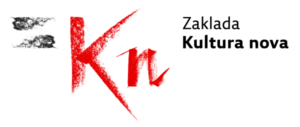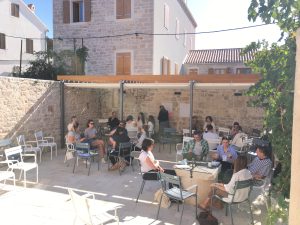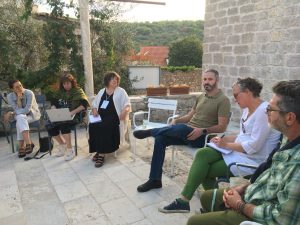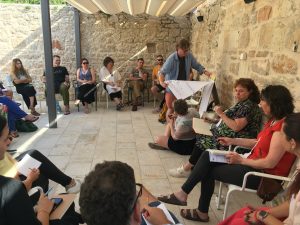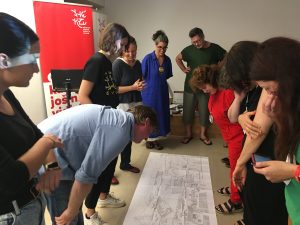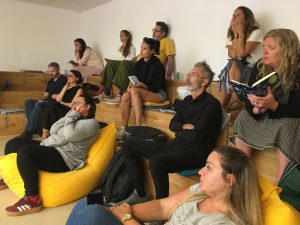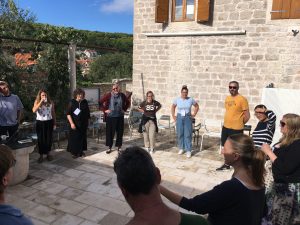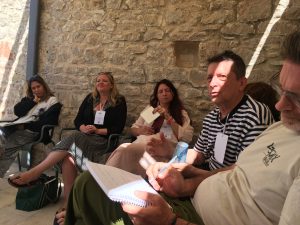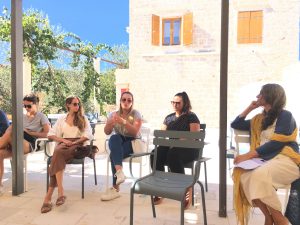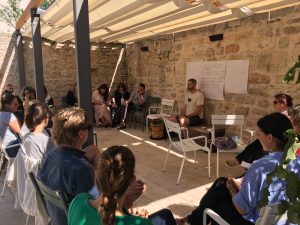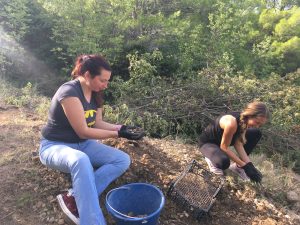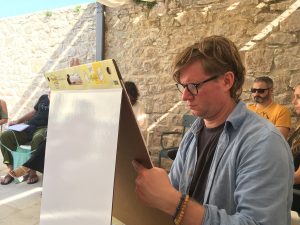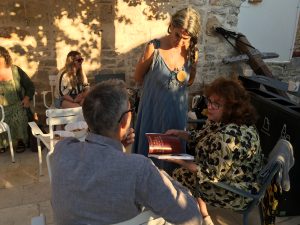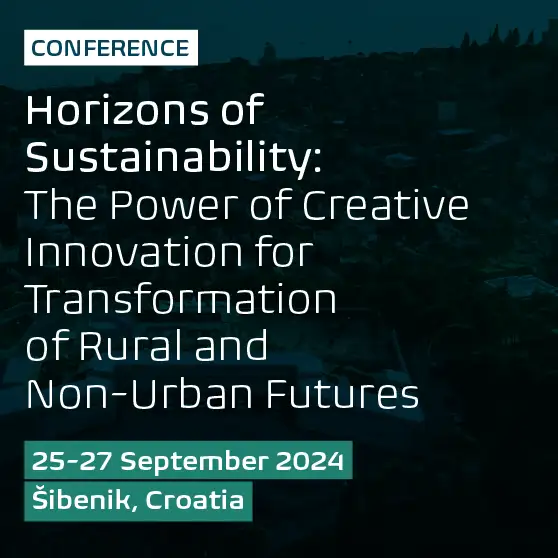Place-based creative solutions for cultivating caring and sustainable communities
20-24 September 2024
Zlarin, Šibenik-Knin County, Croatia
Some photo memories of the IN SITU Summer are available below.
To access the full album, click here
Concept
This Summer School, “Place-based Creative Solutions for Cultivating Caring and Sustainable Communities”, occurs in conjunction with the first international conference of the IN SITU project entitled “Horizons of Sustainability: The Power of Creative Innovation for Transformation of Rural and Non-Urban Futures” (25 – 27 September). Both the Conference and the Summer School will explore the transformative power of innovative approaches of cultural and creative sectors in forging more equitable and sustainable communities beyond urban centres.
The Summer School will take place on the island of Zlarin and will accept up to 25 participants. Aiming to create two-way relations with the context in which it takes place – the island of Zlarin – the Summer School programme is designed to address issues that we consider crucial for their sustainability: community building and engagement, tourism and its adjustments to the needs of the local communities and, finally, care as an organizing principle intertwining all the elements necessary for the growth and well-being of the community.
The omnipresence of sustainability in contemporary discourse is a result of the complex global landscape marked by multiple crises. It has grown into an all-encompassing paradigm spanning climate, energy, finance, food, health, education, and numerous other domains. This Summer School approaches sustainability from the perspective of place-based innovations offered by creative and cultural actors to their communities, designing solutions for and with them, with the aim of imagining better futures. Place-based innovations are particularly significant in non-urban and rural settings, where they effectively address local challenges and enhance the quality of life, vitality and overall sustainability of communities and territories.
To delve deeper into the local environment, the programme of the Summer School also addresses the topic of tourism, a burning issue not only in the Croatian context, where it makes up about 20% of the national GDP. Tourism also has strong effect on the ecological and social environment locally. In the local context, although it represents the main economic power, it is heavily underdeveloped, relying on natural resources, and has shown many gaps in its resilience to numerous outside factors and crises. For this reason, it is important to take into consideration new trends and insights into how it is possible to reshape this dominant branch of the economy into a field based on sustainability and care strategies, benefiting local communities and taking care of environmental protection.
Smaller, distant, rural and non-urban communities are especially vulnerable in times of crisis due to limited resources and facing depopulation challenges. Thus, one of the crucial aspects of placed-based innovation of cultural and creative actors is defining their commitment to care – for children, the elderly, common goods, resource sharing, etc. Care is gaining prominence in sustainability discussions, with some theorists and advocates proposing it as an organising principle for society and the economy. Over the past decade, care has become more relevant in political discourse, shifting from traditional family relations to a broader perspective focusing on reshaping and revitalising communities.
Culture, as a space for dialogue and creation, plays a central role in supporting the transition to a “society of care.” The focus on the relations of care towards a community’s sustainability and development, ecological awareness and the impacts of tourism on them represents an all-encompassing approach which can help in designing appropriate solutions for the concerns of small, isolated areas.
The aim of the Summer School is two-fold. First, to provide space for knowledge and experience exchange among participants, learning from the community and understanding the mechanisms of how the above-mentioned trends impact such small, isolated places. Secondly, to propose solutions and answers for these communities which could be applied to their plans of community development and sustainability.
Thus, the starting point is encounter with the community, its history, practices and specificities. Summer School participants will be taken on a tour of the Croatian Coral Centre Zlarin documenting and presenting the history of the island’s main craft and specificity, which maintained its economy for centuries.
The programme addresses themes of “communities as centres of sustainability” with Avril Joffe and Mark Rainey; “regenerative tourism, culture, and sustainability of non-urban areas” with Patrick Brouder; and “stewardship of place, care and local communities” with Sylvia Amann. The programme is structured to provide insights into these topics through a dialogical format with the international experts in the field, followed by workshops by trainers and local actors. The programme structure offers an incremental and comprehensive approach to acquiring knowledge and skills while applying them to a concrete situation and designing innovative and creative solutions.
Programme
| Day I – Friday, 20 September | |
| Arrival to the island of Zlarin | |
| 18.00 | Get together and meet the participants |
| 19.00 | Meeting with local actors |
| 20.30 | Welcome dinner |
| Day II – Saturday, 21 September | |
| 9.30 | Introduction to Summer School by Nancy Duxbury and Antonija Letinić |
| 10.30 | Visit of Croatian Coral Centre Zlarin and introduction to Zlarin by Katarina Gregov |
| 11.30 | How did Zlarin become the first place without plastic in Croatia? – introduction to the practice by the association Tatavaka |
| 12.00 | Coffee break |
| 12.30 | Introduction to CCIs in rural and non-urban contexts by Nancy Duxbury and Paola Di Nunzio |
| 13.30 | Wrapping up of previous sessions |
| 14.15 | Time for lunch |
| 15.15 | Free time and exploration of the island – informal discussion |
| 17.30 | Coffee break |
| 18.00 | Communities as centres of sustainability – Introductions and discussions by Avril Joffe and Mark Rainey facilitated by Nancy Duxbury |
| Day III – Sunday, 22 September | |
| 9.30 | Innovations and methodology Part I: Working with the community – workshop by Mark Rainey and Antonija Letinić facilitated by Paola Di Nunzio |
| 12.00 | Coffee break |
| 12.30 | Innovations and methodology Part II: Working with the community – workshop by Mark Rainey and Antonija Letinić facilitated by Paola Di Nunzio |
| 13.30 | Wrapping up of previous sessions |
| 14.15 | Time for lunch |
| 15.15 | Free time and exploration of the island – informal discussion |
| 17.30 | Coffee break |
| 18.00 | Regenerative tourism, culture and sustainability of non-urban areas – Introduction and discussion by Patrick Brouder facilitated by Antonija Letinic |
| 20.00 | Working dinner |
| Day IV – 23 Monday, September | |
| 9.30 | Innovations and methodology Part III: Tourism, culture and sustainability of non-urban areas – workshop by Patrick Brouder facilitated by Paola Di Nunzio |
| 12.00 | Coffee break |
| 12.30 | Innovations and methodology Part IV: Tourism, culture and sustainability of non-urban areas – workshop by Patrick Brouder facilitated by Paola Di Nunzio |
| 13.30 | Wrapping up of previous sessions |
| 14.15 | Time for lunch |
| 15.15 | Free time and exploration of the island – informal discussion |
| 17.30 | Coffee break |
| 18.00 | Stewardship of place, care and local communities – Introduction and discussion by Sylvia Amann and Martina Fraioli facilitated by Mark Rainey |
| Day V – 24 Tuesday, September | |
| 9.30 | Innovations and methodology Part V: Non-urban communities and ecological sustainability – Ecological Renaissance Fresco workshop by Ivana Kordić (Association Tatavaka), facilitated by Paola Di Nunzio |
| 12.00 | Coffee break |
| 12.30 | Presentation of the outputs of the Summer School |
| 14.15 | Time for lunch |
| 15.15 | Free time and departure for Šibenik |
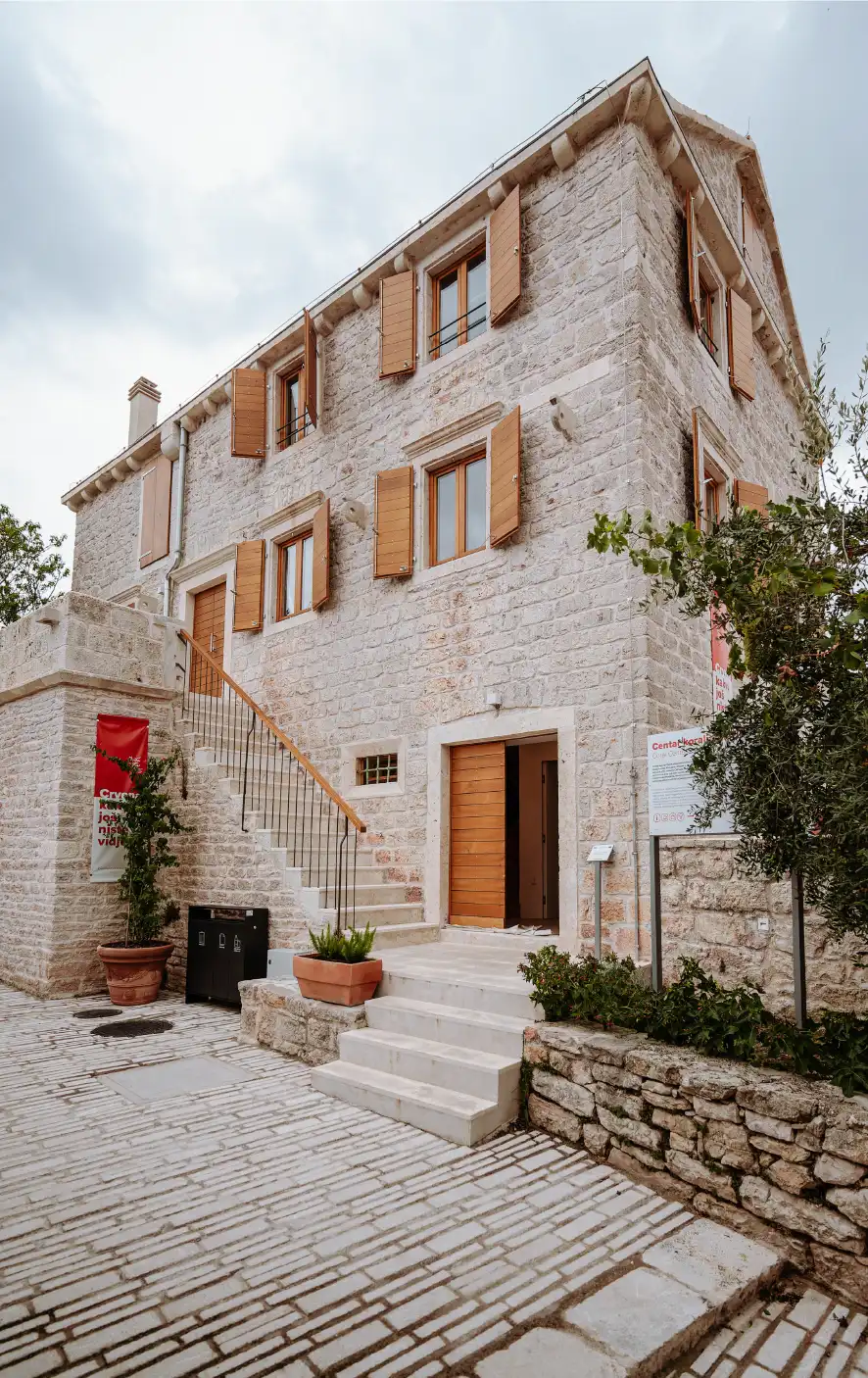
TEACHING TEAM
Antonija Letinić collaborates since 2000 with numerous organisations engaged in the field of cultural and artistic production as well as media in Croatia and abroad. As a member of Kultura Nova Foundation Research and Development Department team, she works on capacity building programmes, international cooperations and programme development. Themes she deals with encompass participation and engagement of audiences and communities, cultural and media education, cultural policy, development and sustainability of cultural actors in current environment as well as the impact of culture on the wider social context. As a member of Croatian Lab within IN SITU project, she is engaged with monitoring and mentoring case studies and other project activities.
Avril Joffe is an economic sociologist with more than 20 years professional experience in the field of cultural policy, culture and development and the cultural economy primarily on the African continent. She is the head of Cultural Policy and Management at the Wits School of Arts, University of the Witwatersrand in Johannesburg, a Post Graduate programme with degrees from Honours, Masters and PhD and which has electives at 3rd and 4th year for all students in the divisions of the Wits School of Arts. Since 2011 Avril has been an active member of the UNESCO’s Panel of Experts for Cultural Policy and Governance undertaking missions to support governments in developing cultural policies, cultural industry strategies, reporting on their implementation of the UNESCO Convention, writing training manuals and contributing to the Global Monitoring Report. Avril was appointed to the Ministerial review panel for the 1996 White Paper on Arts, Culture and Heritage to draft a revised cultural policy for South Africa. Avril is on the board of the National Arts Council and chair of Audit and Risk for the NAC.
The Croatian Coral Center Zlarin presents the story of the centuries-old tradition of coral cultivation on small island in the Šibenik archipelago. Coral harvesting is activity Zlarin is famous for and the most important cultural heritage of island. The first written records about Zlarin coral hunters date back to the 15th century, and red coral branches run through all the pores of life, history and tradition of Zlarin which bears the title of Island of corals because of its history and tradition of extracting, processing and trading corals. With the opening of the Coral Center, red coral becomes the driver of the island’s development in a completely different way. Instead of exploitation, red coral’s attractiveness and status become the basis of the narrative about the need to preserve biodiversity.
The centre will be presented by Katarina Gregov, head of the Croatian Corl Center Zlarin. She is dedicated to preserving the cultural and natural heritage of the island of Zlarin and participates actively in local initiatives and organization of cultural, entertainment and educational events that promote sustainable tourism, environmental and heritage protection, and improve the quality of life on the island. Katarina is a member of the associations Tatavaka, KUD Koralj and Bodulići, and leads the Coral Center Zlarin. In doing so, she balances administrative tasks with new solutions that respect tradition and encourage community development.
Tatavaka was established in 2010 with the purpose of supporting local youth initiatives and the well-being of the community. In 2019 it gave home to citizens’ initiative For Plastic Free Zlarin aimed at raising awareness about the problem of plastic pollution and its prevention by avoidance of single-use plastic use on the island of Zlarin. The initiative was a success and Tatavaka spread this good practice to other island and continental communities in Croatia. Nowdays, the association’s efforts are directed towards revitalization of the island’s traditional freshwater management system by the restoration of Zlarin’s rainwater harvesting slope, dry-stone walls network and connected ponds, and the re-evaluation of sustainable ways of life on the island, as well as restoration of holm oak forests that buffer the climate change extremes and contribute to island’s biodiversity. Regarding climate change, Tatavaka is also contributing to education of youth and adults on the topic of climate change through non-conventional methods such as Climate Fresk introduced to Croatia and a couple of neighboring countries by Tatavaka, in cooperation with Scout Association of Croatia, a number of educational institutions and associations nationwide and beyond. In addition, Tatavaka’s activities encompass organization of cultural and sports activities on the island, most regularly Zlarin Street Music Festival presenting culture and the creation of a community of like-minded people that is growing every day. Another value that the association promotes and encourages is volunteerism. Main activities on the island of Zlarin are based on volunteer work and Tatavaka tries to bring people closer to volunteering as a way of participation in the sustainable development of communities. The association shares the experience of sustainable living in Zlarin with other interested communities and works on advocating public policies and regulations aimed at preventing and suppressing plastic pollution.
Mark Justin Rainey is an urban and cultural geographer at the University of Galway, Ireland. He is a member of UrbanLab Galway and has an interest in placemaking and geographies of development. He is currently working on the Horizon Europe InSitu Project which explores the role of the creative and cultural industries in peripheral areas of Europe including the west of Ireland. He has an interdisciplinary background and combines activism and public engagement with scholarship. Mark has experience in arts management, public consultation and refugee justice activism in the UK, Ireland and Australia. In 2017 he gained his PhD on a joint research project between the Centre for Cultural Studies at Goldsmiths and School of Geography, Queen Mary, University of London. He has published widely and presented work internationally on the topics of political geography, local development, cultural theory, research methods and border studies.
Martina Fraioli has expertise in research on the cultural and creative sectors and in policy analysis, as well as in European project writing and management. She currently works at the European Network of Cultural Centres as a project and research manager, steering European cooperation and research work. She has extensively worked on large European projects, including Creative FLIP, Perform Europe and IN SITU. Her main research and work interests concern the role of culture in just sustainability transitions and the community aspects of societal transformations.
Nancy Duxbury, PhD, is a Researcher at the Centre for Social Studies (CES), University of Coimbra, where she is Coordinator of the Thematic Line “Urban Cultures, Sociabilities, and Participation” (CULTURS) and Coordinator of the CREATOUR Observatory on Culture and Tourism for Local Development. Her current research focuses on CCIs in non-urban areas, culture and local sustainability, cultural mapping, and culture-based development in small cities and rural areas. She is the Principal Investigator of the Horizon Europe project “IN SITU: Place-based innovation of cultural and creative industries in non-urban areas” (2022-2026). She was the Principal Investigator of a major research project on creative tourism, “CREATOUR: Creative Tourism Destination Development in Small Cities and Rural Areas” (2016-2020); and was lead of the CES team contributing to the H2020 project “UNCHARTED: Understanding, Capturing and Fostering the Societal Value of Culture” (2020-2024). She was the European Expert for the South Africa-EU Strategic Partnership project “Cultural Mapping, Planning and Impact Assessment for Sustainable and Just Urban Development.” She is a member of the European Expert Network on Culture and is an Adjunct Professor of Simon Fraser University and Thompson Rivers University, Canada.
Paola Di Nunzio is a Research Manager at the Centre for Social Studies (CES) of the University of Coimbra, currently managing the Horizon Europe-funded project “IN SITU: Place-based innovation of cultural and creative industries in non-urban areas” (2022-2026). She has experience in research, namely in the areas of social innovation, territorial development, inequality and human rights, as well as expertise in project management, grant writing and consultancy in the context of NGOs, SMEs and research centres. Her interests encompass international relations, economic and social inequality, human rights, migrations and development, as well as public policies, social innovation and cultural and creative sectors.
Patrick Brouder is an Associate Professor and Chair of the Department of Tourism Management at Thompson Rivers University, situated at the confluence of the North and South Thompson Rivers on the traditional and unceded territory of the Secwépemc. His work in western Canada focuses on three interrelated areas of innovation in tourism across British Columbia and Yukon: Indigenous tourism (for partner community development), creative tourism (in ‘creative outposts’ in remote areas), and tourism evolution (post COVID-19 processes of regeneration in tourism in rural areas). Originally from Limerick, Ireland, Patrick has been working with communities in Sweden and Canada since 2008. From Jokkmokk in the Arctic region of Sweden, where he did his graduate research, through Niagara Falls, Canada, where he completed his postdoctoral research, to the Pacific coast of Canada, where he now resides, Patrick has been working at the nexus or arts, culture and tourism. His most recent co-edited books are Global Tourism and COVID-19: Implications for Theory and Practice and the Handbook of Innovation for Sustainable Tourism.
Owner of consulting company inforelais (www.inforelais.org) in Austria, Sylvia Amann – after her studies of commercial science and working experiences in cultural networks and policy – founded “inforelais” more than 17 years ago. She is a culture and creative economy policy development expert and strategic consultant for the European Commission, EU agencies, national and regional ministries as well as cultural organisations. Since 2011, Sylvia is member of the EU expert group on cultural and creative industries – as a drafting team member for the OMC Access to Finance report and as a co-chair on good CCI policies for innovation and entrepreneurship. In the context of the Crowdfunding4Culture initiative, Sylvia Amann was responsible to elaborate several case studies on crowdfunding platforms matching with public and private funds.
PUBLIC CALL FOR PARTICIPATION
We invite students, scholars, cultural and creative practitioners, cultural professionals and activists who work with and within smaller communities, in rural and non-urban areas worldwide to participate in the IN SITU Summer School “Place-based Creative Solutions for Cultivating Caring and Sustainable Communities.” It will take place at the island of Zlarin, Šibenik-Knin County, Croatia, from 20 to 24 September 2024.
Be a part of our vibrant and interdisciplinary community of cultural professionals and cultural and creative industries scholars from all over the world. Gain and share knowledge about the innovative agency and potential of cultural and creative actors in rural and non-urban areas and their contributions to the sustainability of the communities where they operate. Share your experiences and insights in an informal setting in a unique location.
- The working language of the Summer School will be English.
- The deadline for submissions to the Public Call for the Summer School is 24 June 2024.
- The Summer School is co-organised by the Centre for Social Studies of the University of Coimbra and the local partner Kultura Nova Foundation from Zagreb in cooperation with the partners of the IN SITU project.
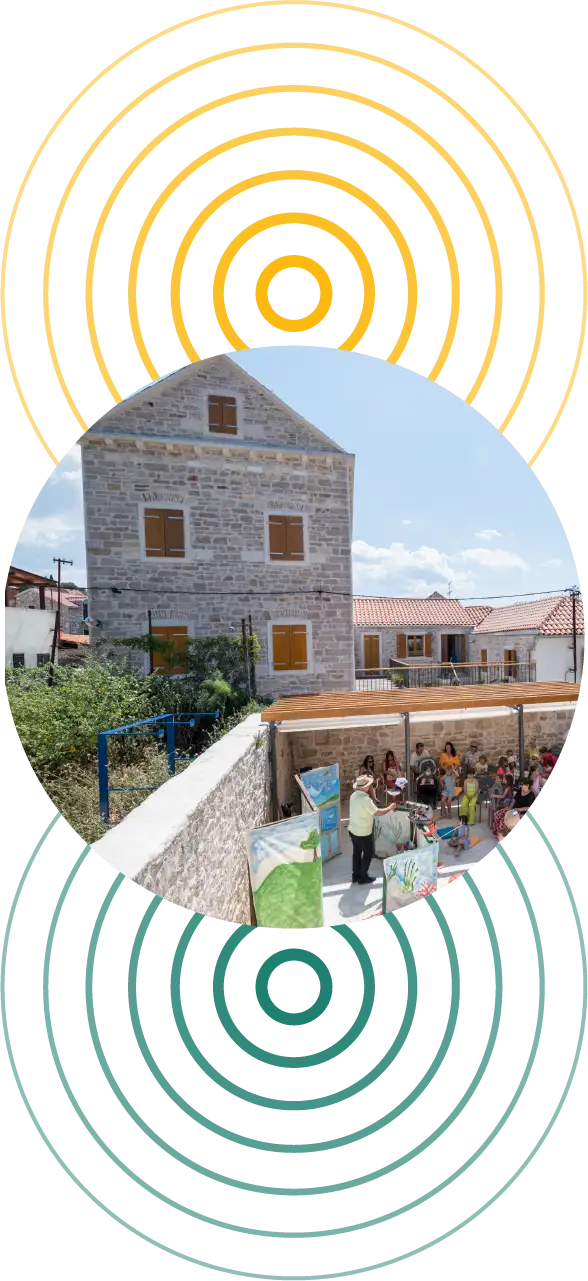
APPLICATION PROCEDURE FOR
THE SUMMER SCHOOL
This Call is open to students, scholars, cultural and creative operators, cultural professionals and activists who work with and within smaller communities, in rural and non-urban areas worldwide.
In the selection process, the following criteria will be applied:
- Applicant is working in the field of arts and culture;
- Applicant has interest and experience in cultural and creative practices in rural and non-urban areas.
After meeting the assessment criteria, applicants to the Summer School will be given priority according to the order of application submission. Selection will be led based on geographical diversity as well as diversity of sectors and disciplines.
Number of participants of the Summer School is limited to 25.
Applications will be evaluated by IN SITU partners.
Key dates and registration fee
Key dates
Applications for the Summer School: until 24 June 2024
Notification of acceptance: 2 July 2024
Earlybird registration: 2 – 31 July 2024
Regular registration: 1 – 15 1 – 22 August 2024 [new deadline]
Summer School dates: 20 – 24 September 2024
Registration fee
Earlybird registration fee: 410€
Regular registration fee: 430€
The fee covers programme and material expenses of the Summer School, 1 welcome dinner, 4 lunches, 1 working dinner, and refreshment breaks during the summer school.
The participants will have to cover their travel and accommodation costs.
Additional note
In order to ensure the participation of representatives of civil society organizations operating in areas with less than 50,000 inhabitants in Croatia in the Summer School program in Zlarin, the “Kultura nova” Foundation announced on June 6, 2024, a public call for participation in the Summer School program. Through the Public Call, the Foundation will select up to 5 representatives of civil society organizations in the field of contemporary culture and art from areas with less than 50,000 inhabitants from Croatia, who will cover travel expenses and the costs of participating in the Summer School program. The public call is available at this link.
Application Form
Applications for the Summer School should be submitted via the online Application Form.
Submission deadline for the Summer School is 24 June 2024.
Applications are NOW CLOSED.
Results
All applicants will be informed about the results of the selection procedure by 5 July 2024.
On behalf of the IN SITU partners, Kultura Nova Foundation will inform all applicants of the selection process results via the e-mail submitted in the application.
If selected, the applicant has to pay the fee for the participation in the Zlarin Summer School programme by 31 July 2024 to be included in the earlybird rate.
Instructions on making the payment will be given to applicants after the confirmation of acceptance.
Summer School cancellation policy
If you should have to cancel your registration, notification in writing should be sent to in-situ-school@ces.uc.pt. Please make sure you state the name of the summer school in the subject line of your email.
- A refund of 40% of the full amount paid will be given for cancellations received between 5 and 31 July 2024.
- No refund will be issued for cancellations received after 31 July 2024 nor failure to attend.
TRAVEL AND ACCOMMODATIONS
Travelling to Zlarin
Zlarin is accessible via boat departing from Šibenik. The ride takes up to 25 minutes. The timetable of the boat is accessible through these links:
The nearest airports are:
- Split Airport – 59 km from Šibenik
- Zadar Airport – 75 km from Šibenik
- Zagreb Airport – 351 km from Šibenik
Though the greatest distance is between Zagreb and Šibenik, there are regular bus lines driving from Zagreb Bus Station to Šibenik and the ride is 3,5 hours long.
Accommodation
ABOUT ZLARIN
Zlarin, a small island on the Adriatic Coast, is situated right across from the Šibenik port. It distinguishes itself by its pristine nature as well as its rich historical and cultural heritage. The total length of the island is just a little bit over 8 km2 and it has less than 300 permanent inhabitants, which gives it a cosy atmosphere and relaxed energy. The highest peak of the island, Klepac, is 169m high and, during sunny and clear days, offers a view on the entire Zlarin sea and Šibenik channel, towards the Velebit mountain on the East and even as far as the volcanic island of Jabuka on the other.
Zlarin bears the title of “Island of corals” because of its history and tradition of extracting, processing and trading corals. With the opening of the Coral Center, red coral has become the driver of the island’s development in a new way – the basis of the narrative about the need to preserve biodiversity.
Another curiosity of the island is that it is the first plastic-free island in Croatia due to the association Tatavaka and local inhabitants. Since the establishment of Tatavaka, its activities have been oriented towards sustainability of the island and the well-being of the community and, thus, in 2019, they launched an initiative “For Zlarin without plastic.” The initiative realized a range of activities to prevent pollution and to spread their good practices to other island and continental communities.
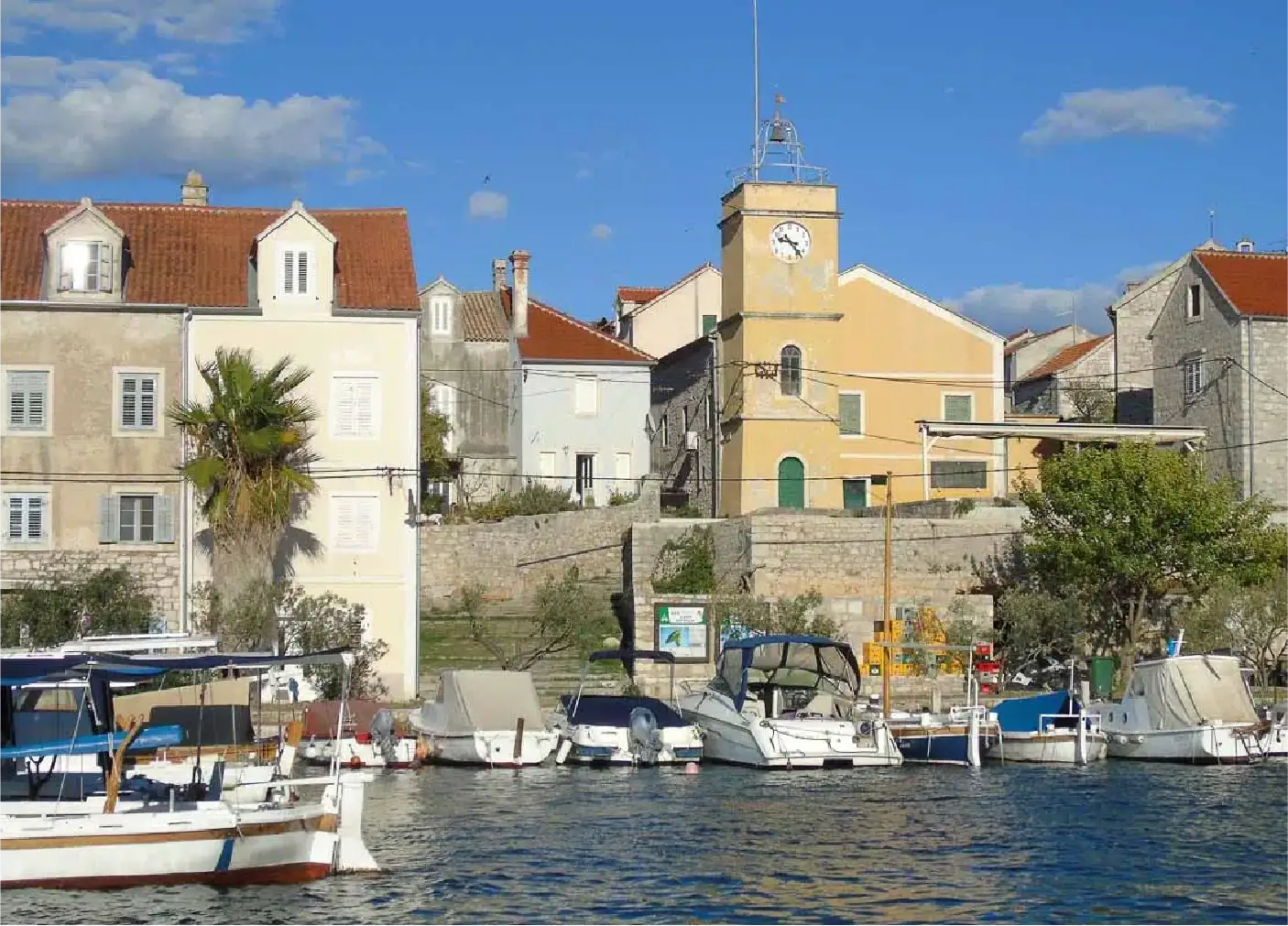
Contact
Any questions about application submissions and/or the summer school should be e-mailed to in-situ-school@ces.uc.pt.
